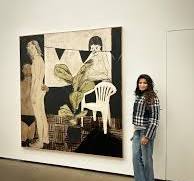The Beauty of Uniqueness
In a world filled with conformity and mass production, the essence of uniqueness shines like a rare gem. What makes something unique is not just its outward appearance, but the story and soul that lie beneath the surface.
Unique creations are born from the depths of imagination, where ideas take shape and form in ways that defy convention. They are a reflection of individuality, a testament to the human spirit’s boundless creativity.
When we encounter something truly unique, whether it be a piece of art, a piece of music, or a person with a remarkable talent, we are drawn to it like moths to a flame. It captivates us, inspires us, and leaves an indelible mark on our hearts and minds.
Embracing uniqueness means celebrating diversity and honoring the myriad expressions of beauty that exist in the world. It is about recognizing the value in what sets us apart and using it as a source of strength and inspiration.
So let us cherish the unique in all its forms – for it is in embracing our differences that we truly discover the richness and beauty of life.
Exploring Uniqueness: Understanding, Creating, and Embracing Individuality
- What makes something unique?
- How can I create something unique?
- Why is uniqueness important?
- Can two things be considered unique if they are similar in some aspects?
- Is it better to be unique or to fit in with the crowd?
- How do you appreciate the uniqueness of others?
- Are there benefits to embracing one’s own uniqueness?
- Can uniqueness be cultivated or is it inherent?
What makes something unique?
In the realm of creativity and innovation, the concept of uniqueness is a captivating enigma that sparks curiosity and contemplation. What sets something apart as truly unique is not merely its physical attributes or superficial characteristics, but rather the intangible essence that emanates from its individuality. It is the fusion of originality, authenticity, and a touch of magic that breathes life into an object, idea, or creation, transforming it into a singular masterpiece that stands out amidst a sea of sameness. True uniqueness lies in the story it tells, the emotions it evokes, and the impact it leaves on those who encounter it – a tapestry woven with threads of passion, vision, and soul that make it irreplaceable and incomparable.
How can I create something unique?
To create something unique, one must delve deep into their own creativity and imagination. Start by exploring your passions, interests, and personal experiences to find inspiration. Embrace experimentation and don’t be afraid to think outside the box. Incorporate elements that are meaningful to you and infuse your work with your own unique perspective. Remember that uniqueness often stems from authenticity, so stay true to yourself and let your individuality shine through in every aspect of your creation. By daring to be different and taking creative risks, you can craft something truly one-of-a-kind that reflects your distinct voice and vision.
Why is uniqueness important?
Uniqueness is important because it defines our individuality and sets us apart from others in a world where conformity often prevails. Embracing what makes us unique allows us to express our creativity, share our perspectives, and contribute something distinctive to the world. It fosters diversity, innovation, and personal growth, encouraging us to celebrate our differences rather than conform to societal norms. By valuing uniqueness, we honor the richness of human experience and create a more vibrant and inclusive society where each person’s voice is valued for its distinctiveness.
Can two things be considered unique if they are similar in some aspects?
In considering whether two things can be deemed unique despite sharing similarities in certain aspects, it is important to recognize that uniqueness is not solely defined by differences alone. While similarities may exist between two entities, their overall combination of characteristics, context, and individuality can still contribute to their uniqueness. It is the nuanced interplay of shared traits and distinctive features that ultimately determines the singular identity and essence of each thing, allowing them to stand out in their own right despite any parallels they may possess.
Is it better to be unique or to fit in with the crowd?
When considering whether it is better to be unique or to fit in with the crowd, one must reflect on their values and aspirations. While fitting in may provide a sense of belonging and acceptance, embracing one’s uniqueness can lead to self-discovery, personal growth, and genuine fulfillment. Striving to stand out from the crowd allows individuals to express their authentic selves, contribute their distinct perspectives, and make a meaningful impact on the world around them. Ultimately, the choice between being unique or conforming lies in finding a balance that aligns with one’s identity and values while also respecting the diversity of others.
How do you appreciate the uniqueness of others?
Appreciating the uniqueness of others involves cultivating a mindset of openness, empathy, and respect. It requires acknowledging and valuing the diverse qualities, perspectives, and experiences that make each individual distinct. To appreciate the uniqueness of others, one can actively listen to their stories, learn from their different viewpoints, and embrace the beauty in their individuality. By celebrating the strengths and differences of those around us, we foster a culture of inclusivity and understanding that enriches our relationships and broadens our own horizons.
Are there benefits to embracing one’s own uniqueness?
Embracing one’s own uniqueness comes with a myriad of benefits that can enrich one’s life in profound ways. By celebrating our individuality, we cultivate a sense of self-acceptance and confidence that empowers us to navigate the world with authenticity and resilience. Embracing what makes us different allows us to stand out from the crowd, fostering creativity, innovation, and personal growth. It also enhances our relationships by fostering genuine connections based on mutual respect and understanding. Ultimately, embracing our uniqueness enables us to lead fulfilling lives guided by our true selves, making a positive impact on both ourselves and those around us.
Can uniqueness be cultivated or is it inherent?
The question of whether uniqueness can be cultivated or is inherent sparks a debate that delves into the complexities of individuality and creativity. While some argue that uniqueness is an inherent trait, deeply rooted in one’s personality and genetic makeup, others believe that it can be nurtured and developed through experiences, influences, and personal growth. Cultivating uniqueness may involve exploring new ideas, stepping outside of comfort zones, and embracing one’s authentic self. Ultimately, the interplay between innate qualities and external influences shapes each person’s journey towards discovering their own brand of uniqueness.





